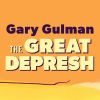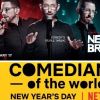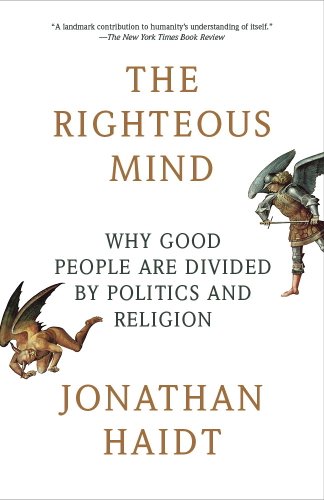9 Morality Books That Will Change How You Think About Right and Wrong
Discover why experts like Timothy Keller, Jenna Ellis, and Jane Goodall recommend these Morality Books for deeper ethical insight







What if everything you believed about morality was just the tip of the iceberg? Morality shapes not only personal choices but the very fabric of society. Yet, it's often tangled in cultural debates and personal biases, making it hard to see clearly. As you navigate this complex terrain, understanding diverse perspectives becomes essential.
Experts like Timothy Keller, founder of Redeemer Presbyterian Church, emphasize the importance of grounding morality in both theology and culture. Constitutional attorney Jenna Ellis highlights the legal and scientific implications that challenge common views on identity and ethics. Meanwhile, primatologist Jane Goodall brings a compassionate lens to animal rights, blending moral philosophy with real-world empathy.
These nine books reflect the insights of thought leaders wrestling with morality's many faces—from philosophical frameworks and religious ethics to social cohesion and animal welfare. While these expert-curated books provide proven frameworks, readers seeking content tailored to their specific backgrounds and goals might consider creating a personalized Morality book that builds on these insights.
Recommended by Timothy Keller
Founder of Redeemer Presbyterian Church
“Nancy R. Pearcey's book, Love thy Body is an important read focusing on the theological truth that our bodies are part of the image of God in us, a crucial part of 'who we are', and not a discardable container.” (from X)
by Nancy R. Pearcey··You?
by Nancy R. Pearcey··You?
What if everything you knew about morality was wrong? Nancy R. Pearcey challenges popular secular views that separate the body from identity and dignity, arguing that such detachment undermines human rights and social ethics. Drawing from her extensive background in Christian apologetics and worldview studies, she explores how contemporary debates on transgenderism, abortion, sexuality, and the sexual revolution reflect deeper misunderstandings about the human body. You’ll gain a nuanced grasp of how secular philosophies impact legal and cultural norms, especially through Pearcey’s detailed critique of mind-body dualism and its consequences. This book is best suited for those grappling with moral questions in culture, theology, or law, seeking a thoughtful alternative grounded in the significance of the embodied human self.
Recommended by Gary Gulman
Comedian and HBO series creator
“I am LOVING Ken Tremendous’s new book How To Be Perfect: The Correct Answer To Every Moral Question. I am reading, learning, and laughing. These are my 3 favorite things to do in combination. Congratulations Michael!” (from X)
by Michael Schur··You?
by Michael Schur··You?
When Michael Schur, known for creating beloved TV comedies like The Good Place and Parks and Recreation, decided to tackle morality, he drew on 2,400 years of philosophical thinking to make ethics approachable and even funny. This book walks you through ethical frameworks—from deontology to utilitarianism—starting with simple questions like "Should I punch my friend?" and advancing to thornier issues such as the morality of enjoying art made by bad people. You'll come away understanding key philosophical concepts and how to apply them in everyday dilemmas, making it a smart choice if you want to sound insightful at conversations or just think more clearly about right and wrong.
by TailoredRead AI·
by TailoredRead AI·
This personalized book provides a structured approach to moral values and ethical decision-making, focusing on how you can apply ethical principles within your own life context. It offers a tailored framework that emphasizes practical strategies for navigating moral dilemmas, balancing personal beliefs with societal expectations. By cutting through generic advice, it addresses how to integrate ethical theories with your unique background and goals, fostering meaningful moral reflection and action. The book explores various dimensions of ethics, including virtue ethics, consequentialism, and deontology, while helping you develop customized guidelines to enhance integrity and purposeful living.
Recommended by Jane Goodall
Primatologist and conservationist
“A Plea for the Animals is fascinating, instructive and compelling, speaking to us on both an intellectual and emotional level.”
by Matthieu Ricard··You?
When Matthieu Ricard first discovered the depth of suffering animals endure, he crafted a compelling moral argument that challenges long-held human practices. Drawing from his background as a Buddhist monk and advocate for altruism, Ricard examines the ethical, philosophical, and scientific reasons for extending compassion beyond humans to all sentient beings. You’ll gain insights into the systemic exploitation of animals for food, clothing, and entertainment, alongside critiques of common justifications for such treatment. This book suits anyone grappling with the ethics of animal rights and seeking a reasoned case for kindness toward nonhuman life.
Recommended by Claire Lehmann
Founder & editor of Quillette
“This fascinating new book from @ME_McCullough about how our species came to be cooperative and altruistic is now available on Audible Recommended →” (from X)
by Michael E. McCullough··You?
by Michael E. McCullough··You?
When Michael E. McCullough first examined the puzzle of human kindness, he realized that evolutionary biology alone couldn't explain why inherently self-interested apes developed cooperative moral codes. Drawing on his psychology expertise at the University of California, San Diego, McCullough traces how historical crises—from early human settlements to post-World War II upheavals—forced humanity to invent new moral frameworks through reason rather than instinct. You’ll gain insight into the psychological and social mechanisms behind moral invention and how these have shaped human concern beyond mere evolutionary impulses. This book suits anyone interested in understanding morality's origins and how we might rethink ethics amid today's global challenges like climate change and nationalism.
Recommended by Christianity Today
“C. S. Lewis understood, like few in the past century, just how deeply faith is both imaginative and rational.”
by C. S. Lewis··You?
by C. S. Lewis··You?
When C. S. Lewis first discovered the disconnect many feel between faith and reason, he wrote this book to bridge that gap with clear, logical discussion. You’ll explore fundamental questions about right and wrong, human nature, and the foundations of morality, all through Lewis's unique lens combining imagination and intellect. Chapters like his analysis of "the Law of Human Nature" and reflections on forgiveness and kindness offer tangible frameworks to understand complex moral issues. This book suits anyone wrestling with ethical questions or curious about Christianity’s moral arguments without prior theological background. It’s straightforward yet invites you to reconsider your views on morality and faith.
by TailoredRead AI·
This personalized book offers a focused, step-by-step plan to enhance your moral reasoning and ethical behavior over 30 days. It provides a tailored approach that fits your specific background and goals, cutting through generic advice to address your unique ethical challenges. The content explores core concepts of moral philosophy, practical decision-making frameworks, and strategies for applying ethical principles in everyday life. By integrating reflective exercises and actionable steps, it guides you through developing a nuanced ethical mindset, improving your moral clarity and consistency. This tailored framework emphasizes real-world application, helping you internalize values and navigate complex moral situations effectively within your personal and professional context.
Recommended by The New York Times
“David Brooks’s gift—as he might put it in his swift, engaging way—is for making obscure but potent social studies research accessible and even startling.”
by David Brooks··You?
by David Brooks··You?
What if everything you knew about personal success was wrong? David Brooks argues that true fulfillment lies beyond conventional achievements, in a life centered on deeper commitments. Drawing from his extensive experience as a columnist and social commentator, he explores the transition from self-focused ambition to a broader, other-centered purpose, examining commitments to family, vocation, faith, and community. You’ll gain a nuanced understanding of how these commitments shape moral lives, challenging the culture of individualism with vivid examples and thoughtful reflection. This book is particularly insightful if you’re seeking meaning beyond career milestones and want to embrace a life of interdependence and purpose.
Recommended by Bridget Phetasy
Writer and cultural commentator
“I love @JonHaidt's book The Righteous Mind so much and I think it all boils down to: "never forget everyone is full of shit including me."” (from X)
by Jonathan Haidt··You?
by Jonathan Haidt··You?
When Jonathan Haidt first challenged the prevailing view that morality is primarily shaped by reason, he revealed instead that our gut feelings drive moral judgments. Drawing from over 25 years of research in social psychology, he dissects how liberals, conservatives, and libertarians have differing moral intuitions yet often hold valid concerns. You’ll find compelling explanations of moral foundations and how they influence political and religious divides, with insightful chapters on group loyalty, authority, and sanctity. If you want to grasp why seemingly good people clash over core values and how cooperation emerges despite conflicts, this book will expand your understanding — especially if you navigate diverse social or political environments.
Recommended by Sue Coe
Artist known for social justice work
“If the suffering and death of 70 billion land animals and 1 trillion sea animals, weighs no more to you than a sack of feathers, read no further. Veganism is not extreme. What is extreme is the mental daily effort required to be indifferent to the senseless violence inflicted onto the innocent, because they are 'only animals.' Abolition of all animal exploitation, is now a global movement, thanks to Gary Francione’s vision. He saw animals truly as persons, not things, not property, when so few others did.”
by Gary Francione··You?
by Gary Francione··You?
Unlike most morality books that focus on abstract ethical theory, Gary Francione grounds his argument in the concrete issue of animal rights and veganism. Drawing from his extensive legal and philosophical expertise, he challenges the common belief that animals can be used humanely as property, insisting instead that moral consistency demands veganism. You’ll explore why viewing animals as persons rather than commodities reshapes how justice applies to them, with clear explanations that don’t require prior legal knowledge. This book suits anyone wrestling with ethical consistency about animals and those seeking a rational basis for veganism, especially through Francione’s dismantling of popular justifications for animal use.
by Jonathan Sacks··You?
by Jonathan Sacks··You?
Jonathan Sacks, a respected religious leader and philosopher with decades guiding moral thought, wrote this book to address the fraying social fabric amid modern challenges like political division and declining shared values. You’ll explore how the loss of common moral frameworks has impaired democracy and community life, and why reclaiming a collective sense of responsibility matters. The book traces moral philosophy from ancient Greece through the Enlightenment, illustrating how neither market forces nor government alone can sustain ethical living. If you wrestle with questions about societal cohesion or seek a thoughtful analysis of morality’s role today, this book offers a grounded, historical perspective rather than quick fixes.
Get Your Personal Morality Guide in 10 Minutes ✨
Stop sifting through generic advice. Receive ethical strategies tailored to your life and values without reading dozens of books.
Join 15,000+ Morality enthusiasts who've personalized their approach
Conclusion
Across these books, three themes stand out: first, morality is deeply connected to identity and community, as seen in works like Love Thy Body and Morality. Second, understanding moral psychology and evolution helps explain why people differ so much, a point Jonathan Haidt explores in The Righteous Mind. Third, ethical concern extends beyond humans to animals, a call powerfully made in A Plea for the Animals and Why Veganism Matters.
If you're wrestling with cultural and personal ethical questions, start with Love Thy Body or Mere Christianity for foundational perspectives. For a blend of humor and philosophy, How to Be Perfect offers engaging clarity. Those seeking to connect morality with purpose and social commitment should explore The Second Mountain.
Once you've absorbed these expert insights, create a personalized Morality book to bridge the gap between general principles and your specific situation. This tailored approach can deepen your understanding and help translate complex ideas into your daily life and values.
Frequently Asked Questions
I'm overwhelmed by choice – which book should I start with?
Start with How to Be Perfect. Its approachable style uses humor and clear explanations to introduce key moral concepts, making it ideal if you're new to morality or want a broad yet engaging overview.
Are these books too advanced for someone new to Morality?
Not at all. Books like Mere Christianity and How to Be Perfect break down complex ideas into accessible language. They’re perfect for beginners while still offering depth for seasoned readers.
What’s the best order to read these books?
Begin with accessible introductions like How to Be Perfect or Mere Christianity, then explore thematic works such as Love Thy Body or The Righteous Mind. Finally, dive into specialized topics like animal ethics with A Plea for the Animals.
Do I really need to read all of these, or can I just pick one?
You can definitely start with one, but each book offers unique insights. Together, they provide a well-rounded understanding of morality’s many dimensions—from personal to societal to animal ethics.
Are any of these books controversial or contradictory?
Some explore different approaches to morality, like religious versus secular views, which naturally differ. This diversity invites you to weigh perspectives and form your own nuanced understanding.
How can I get moral insights tailored to my specific needs or background?
While these expert books offer broad frameworks, personalized Morality books can focus on your unique interests and goals. They complement expert insights by delivering targeted, practical guidance. Try creating your own personalized Morality book to get started.
📚 Love this book list?
Help fellow book lovers discover great books, share this curated list with others!
Related Articles You May Like
Explore more curated book recommendations








